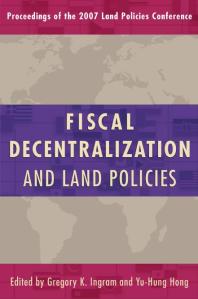

Most ebook files are in PDF format, so you can easily read them using various software such as Foxit Reader or directly on the Google Chrome browser.
Some ebook files are released by publishers in other formats such as .awz, .mobi, .epub, .fb2, etc. You may need to install specific software to read these formats on mobile/PC, such as Calibre.
Please read the tutorial at this link. https://ebooknice.com/page/post?id=faq
We offer FREE conversion to the popular formats you request; however, this may take some time. Therefore, right after payment, please email us, and we will try to provide the service as quickly as possible.
For some exceptional file formats or broken links (if any), please refrain from opening any disputes. Instead, email us first, and we will try to assist within a maximum of 6 hours.
EbookNice Team

Status:
Available0.0
0 reviews(Ebook) Fiscal Decentralization and Land Policies 1st Edition by Gregory K Ingram, Yu Hung Hong - Ebook PDF Instant Download/Delivery: 9781558442597 ,1558442596
Full download (Ebook) Fiscal Decentralization and Land Policies 1st Edition after payment

Product details:
ISBN 10: 1558442596
ISBN 13: 9781558442597
Author: Gregory K Ingram, Yu Hung Hong
(Ebook) Fiscal Decentralization and Land Policies 1st Edition Table of contents:
The Nexus of Fiscal Decentralization and Land Policy — Gregory K. Ingram & Yu‑Hung Hong
Opportunities and Risks of Fiscal Decentralization: A Developing Country Perspective — Roy Bahl
Local Revenues Under Fiscal Decentralization in Developing Countries: Linking Policy Reform, Governance, and Capacity — Paul Smoke
Commentary by Robert D. Ebel
Local Service Provision in Selected OECD Countries: Do Decentralized Operations Work Better? — Ehtisham Ahmad, Giorgio Brosio & Vito Tanzi
Commentary by Paul Bernd Spahn
Political Structure and Exclusionary Zoning: Are Small Suburbs the Big Problem? — William A. Fischel
Commentary by Lee Anne Fennell
School Finance Reforms, Property Tax Limitation Measures, and the Distribution of Expenditures and Class Sizes — Daniel P. McMillen & Larry D. Singell Jr.
Commentary by Dennis N. Epple
Decentralization and Environmental Decision Making — Shelby Gerking
Commentary by Lawrence Susskind
A Cross-Country Comparison of Decentralization and Environmental Protection — Hilary Sigman
Commentary by Maureen L. Cropper
Interjurisdictional Competition Under U.S. Fiscal Federalism — Sally Wallace
Commentary by Jeffrey S. Zax
Local Government Finances: The Link Between Intergovernmental Transfers and Net Worth — Luiz R. De Mello
Commentary by Ronald C. Fisher
Fiscal Decentralization and Income Distribution — Jorge Martinez‑Vazquez & Cristian Sepulveda
Commentary by Christine P. W. Wong
Public and Private School Competition and U.S. Fiscal Federalism — Thomas J. Nechyba
Commentary by Helen F. Ladd
Community Associations: Decentralizing Local Government Privately — Robert H. Nelson
Commentary by Robert W. Helsley
Increasing the Effectiveness of Public Service Delivery: A Tournament Approach — Clifford F. Zinnes
Commentary by José Roberto R. Afonso & Sérgio Guimarães
People also search for (Ebook) Fiscal Decentralization and Land Policies 1st Edition:
the decentralization of taxation systems
decentralization taxes
under fiscal federalism
fiscal decentralization and economic growth in the united states
discuss fiscal decentralization
Tags: Gregory K Ingram, Yu Hung Hong, Fiscal Decentralization, Land Policies